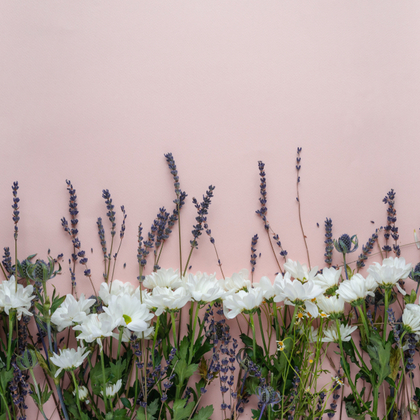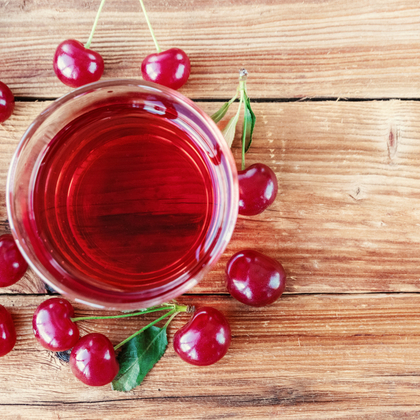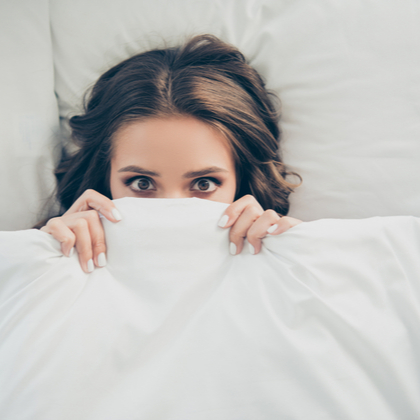
Managing insomnia can leave you feeling frustrated and exhausted. To remedy sleeplessness, there are some medical treatments available. While these methods can be helpful, there are also several natural remedies to try alongside, or before, seeking medical options. Below, we’ll break down some of these treatments, outlining how they can help to promote sleep.
Relaxation techniques
Meditation
The benefits of meditation are manifold. Alongside supporting the reduction of anxiety and other mood disturbances, this simple practice can also ease the body into sleep. Scientifically speaking, meditation lowers your heart rate by awakening the parasympathetic nervous system and encouraging slower breathing, which relaxes you and increases the likelihood of quality sleep.i To allow the body to de-stress, slow down, and unwind, put aside 10 minutes before bed for an easy breathing meditation practice. You can find sleep-based guided meditations online or via an app.

Visualisation
New research conducted by the University of Oxford found that visualising an environment where you feel calm could have an overwhelmingly positive effect on sleep.ii The theory behind this ‘imaginary distraction’ is visualising a place that’s engaging enough to pull you away from the anxieties and stress in your mind, such as a waterfall, beach or meadow.
Essential oils
Aromatherapy — in particular lavender essential oil — is widely touted for promoting sleep and relaxation. In a 2005 study, researchers revealed that participants who inhaled lavender for two minutes at three, 10-minute intervals before bedtime improved their sleep quality and felt more energised when they woke up.iii Alongside inhalation, you could diffuse lavender essential oil, sprinkle it on your pillow, or add a few drops to a hot bath before bed. Discover more ways to use essential oils for sleep and relaxation.
Gratitude journaling
Gratitude journaling is another effective tool to help you unwind before bed. Research shows that if you cultivate gratitude throughout the day, you’re more likely to have optimistic, happy thoughts as you fall asleep.iv Before sleeping, try writing down three to five things you feel grateful for that day.
Nutrition
Magnesium
Nutrition plays a key role in sleep hygiene. Foods rich in magnesium (bananas, pumpkin seeds, and figs) are especially beneficial for preparing the body for rest. Otherwise known as ‘nature’s tranquilliser’, this potent mineral helps to activate the neurotransmitters responsible for relaxing the body and mind, which can encourage healthy sleeping patterns.v
Tryptophan
Eating food high in tryptophan can also prime the body for sleep. When the body metabolises tryptophan, it turns into serotonin and melatonin — two of the main hormones that facilitate and regulate sleep.vi Rich sources of tryptophan include oats, nuts, and milk.
Sugar, alcohol, caffeine, fast food and cheese are all foods that keep you awake at night, so avoid consuming them before bed. For nightime nutritional advice, here are 6 foods to help you sleep at night.
Herbal Remedies
When it comes to herbal remedies for insomnia, there are a number of options available.
Theanine & Lemonbalm
These nutritional agents have demonstrated enormous promise in soothing anxiety and promoting relaxation — both of which are vitally important for preparing the body for rest.vii
Valerian Root
This herb comprises of potent compounds — isovaleric acid, valerenic acid, and a range of antioxidants — that both relax and sedate the body, improving sleep quality and quantity and fighting insomnia.viii
St John’s Wort
Traditionally used to manage low mood and anxiety — which can aid sleep in its own right as insomnia is often a by-product of these mood disturbances — St John’s Wort supports sleep by influencing the brain chemistry involved in the body’s circadian rhythm (sleep-wake cycle).ix
Behavioural techniques
Get up and entertain yourself for 10 minutes
If you can’t fall asleep within 30-minutes, get out of bed and entertain yourself for 10 minutes with something that requires your head and hands, like a mindfulness colouring exercise. Avoid turning to your phone or using your laptop, as the blue light will only keep you awake for longer. Ultimately, you need to see your bed as a place for sleeping – not a place for worrying, ruminating, and feeling anxious.
Cognitive behaviour therapy
CBT aims to change the thoughts and behaviours around sleeping habits that often perpetuate sleep difficulties. Often, those with chronic insomnia have deep-rooted misconceptions or emotions about sleep. Therapists use coaching, conversation, and ‘homework’ to correct these mental blocks.
A recent meta-study revealed that CBT is as effective as treating insomnia as sleeping medications.x Your GP can point you in the right direction of finding an appropriate cognitive behavioural therapist.
Sleep restriction therapy
The premise of this strategy forces the body to sleep during a fixed window and stay awake for the rest of the time, helping to reset your natural body clock. This routine is designed to restrict sleep, which will lead to tiredness and, ultimately, better sleep quality. For instance, if you normally go to bed at 10.30 pm and wake up at 6.30 pm, but report sleeping for only 6 hours, your new sleep window may start with an 11.30 bedtime and a 5.30 wake-up.
There’s no quick fix to insomnia — it simply comes down to finding which method works best for you. For more information on how to achieve a better night’s sleep, feel free to browse more articles in our sleep hub.
References:
-
Harvard Health. (2019). Meditation offers significant heart benefits. Available online: https://www.health.harvard.edu/heart-health/meditation-offers-significant-heart-benefits
Psychology Today. (2019). How Deep Relaxation Affects Brain Chemistry. Available online: https://www.psychologytoday.com/us/blog/the-mysteries-love/201503/how-deep-relaxation-affects-brain-chemistry -
Harvey. A. & Payne. S. (2002). The management of unwanted pre-sleep thoughts in insomnia: distraction with imagery versus general distraction. Behaviour Research and Therapy. 40(3), 267-277.
-
Goel. N., Kim. H. & Lao. R. (2005). An Olfactory Stimulus Modifies Nighttime Sleep in Young Men and Women. Chronobiology International. 22(5), 889-904.
-
Emmons. R. & McCullough. M. (2003). Counting blessings versus burdens: An experimental investigation of gratitude and subjective well-being in daily life. Journal of Personality & Social Psychology. 84(2), 377-389.
-
Wienecke. E. & Nolden. C. (2016). Long-term HRV analysis shows stress reduction by magnesium intake. MMW Fortschr Med. (Suppl 6): 12-16
-
Richard. D.M., Dawes. M.A., et al. (2009). L-Tryptophan: Basic Metabolic Functions, Behavioral Research and Therapeutic Indications. International Journal of Tryptophan Research. 2, 45–60.
-
Nathan. P., Lu. K., et al. (2016). The Neuropharmacology of L-Theanine(N-Ethyl-L-Glutamine). Journal of Herbal Pharmacotherapy. 6(2), 21-30.
-
Bent. S., Padula. A., et al. (2006). Valerian for Sleep: A Systematic Review and Meta-Analysis. The American Journal of Medicine. 119(12), 1005-1012.
-
NCCIH. (2019). Questions and Answers: A Trial of St. John's Wort (Hypericum perforatum) for the Treatment of Major Depression. Available online: https://nccih.nih.gov/news/2002/stjohnswort/q-and-a.htm
Mind.org.uk. (2019). Available online: https://www.mind.org.uk/media/715755/making-sense-of-st-johns-wort-2014.pdf -
Mitchell. M., Gehrman. P. (2014). Comparative Effectiveness of Cognitive Behavioral Therapy for Insomnia: A Systematic Review. Focus. 12(1), 80-89.
Related Posts

Olivia
Olivia Salter has always been an avid health nut. After graduating from the University of Bristol, she began working for a nutritional consultancy where she discovered her passion for all things wellness-related. There, she executed much of the company’s content marketing strategy and found her niche in health writing, publishing articles in Women’s Health, Mind Body Green, Thrive and Psychologies.
View More



